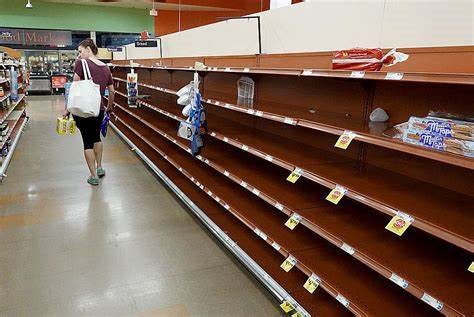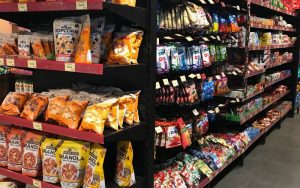Food shortages in the UK are a growing concern. This means there might not be enough food for everyone, leading to empty store shelves and higher prices. Recently, several things have happened that make people worry about food shortages. For example, disruptions from the COVID-19 pandemic, the ongoing effects of Brexit, and unexpected weather events.
This blog will explore the factors that are causing food shortages in the UK. We’ll look at how they might affect businesses and customers, and what we can do about it. By the end, you’ll have a better understanding of what’s going on and some ideas on how to deal with it.
Understanding Food Shortages
Food shortages happen when there’s not enough food available to meet people’s needs. This can lead to empty shelves in stores, higher food prices, and people struggling to buy what they need to eat. Food shortages can hurt individuals and society in big ways. Families might not have enough to eat, causing stress and health problems. When food shortages happen in a country, it can cause economic troubles and make it harder for people to stay healthy.
Signs and Indicators of Food Shortages
When food shortages are about to happen, there are some clear signs that you can look out for. One of the first signs is empty shelves in supermarkets. If you notice that it’s getting harder to find basic items like bread, milk, or vegetables, that could be a sign of food shortages. Another sign is when food prices start to go up quickly. If it suddenly costs a lot more to buy your usual groceries, it might be because there’s less food available.
Supply chain delays are another clue that food shortages could be coming. This happens when there are problems with getting food from farms to stores. It could be due to transportation issues, labour shortages, or disruptions in production. When this happens, it can cause delays in restocking supermarket shelves, leading to more empty spots.
Factors that Leading to Food Shortages in the UK
Food shortages in the UK can happen for many reasons, often working together to create bigger problems. Here are the major factors causing these shortages:
1. Environmental Factors
Climate change and extreme weather events are affecting agriculture around the world, including in the UK. Changes in temperature and rainfall can hurt crops, leading to smaller harvests. Severe weather events like storms, floods, and droughts can damage farms and make it hard to grow food. This reduces the amount of food available and can lead to higher prices because there’s less to go around. When the weather is unpredictable, it also makes it harder for farmers to plan their planting and harvesting seasons.
Professor Chris Elliott from Queen’s University Belfast said that fruits and vegetables are likely to be especially hit by shortages. Earlier in 2023, there were shortages of eggs and oil, and supermarkets had to limit how many tomatoes and cucumbers people could buy because bad weather in southern Europe hurt their crops.
The food security expert blamed the Government for not having a clear long-term strategy and noted that the UK’s farming industry is in serious decline.
2. Brexit-related Changes
Brexit, which is the UK’s exit from the European Union (EU), has had a big impact on how food is supplied. Before Brexit, the UK could easily trade with EU countries, which made it simpler to import food and other goods. But after Brexit, new trade rules and extra paperwork made it harder and slower to bring things into the UK. This disruption affects supply chains, the systems that move food from farms to stores. It also impacts labour markets, as many workers from the EU used to work in UK farms and food processing, but now it’s more difficult for them to come to the UK.
3. Global Supply Chain Disruptions
The COVID-19 pandemic caused huge disruptions in the way goods are moved around the world. Factories closed, ships couldn’t sail, and planes were grounded. This created delays and made it harder to get food and other supplies into the UK. Even when things started to get back to normal, other global events, like geopolitical conflicts and trade disputes, continued to disrupt the flow of goods. These disruptions mean that food might take longer to arrive, causing gaps on supermarket shelves.
Experts explain that we don’t really have food shortages, but there’s a problem with getting food delivered because there aren’t enough truck drivers and other delivery workers. This shortage of workers is due to COVID-19 and Brexit.
The increase in online shopping, especially with next-day delivery, has grown even more popular after the pandemic. This means customers expect more deliveries, and they want them faster, but there are fewer drivers available to make those deliveries.
4. Labour Shortages
Finding enough workers for farming, transport, and food production has become a challenge. Many of these jobs require a lot of physical work, and fewer people are willing to do them, especially with the uncertainty caused by Brexit and the pandemic. This shortage of workers means there’s less food being grown, harvested, and delivered to stores. When there aren’t enough truck drivers to transport food, it can cause delays and interruptions in getting food to where it’s needed.
The British Poultry Council estimates that one in six jobs in the industry is currently vacant as a result of workers returning to the EU (Aljazeera).
According to the Road Haulage Association, the UK currently needs around 100,000 more drivers to operate large trucks that transport heavy goods. This shortage is causing problems with delivering items across the country.
Together, these factors create a complicated situation that makes food shortages more likely in the UK. Understanding these causes helps explain why it’s so important to find solutions to keep the food supply stable and ensure everyone has enough to eat.
Impact on Consumers and Businesses
Food shortages can have a big impact on consumers and businesses. For households, it means you might find empty shelves at the grocery store and have fewer choices. Prices might go up, making it more expensive to buy your usual groceries. For restaurants, food producers, and retailers, food shortages can disrupt their operations. Restaurants might have to change their menus, food producers could face delays in getting ingredients, and retailers may have trouble keeping popular items in stock. On a larger scale, food shortages can affect the economy by reducing business revenue and increasing food costs for everyone. This could lead to inflation and make it harder for families to afford basic necessities.
What Can Be Done to Address Food Shortages?
There are several ways to tackle food shortages and make sure there’s enough food for everyone. Here are the most important points:
Government Policies to Support Farming and Trade: Governments can create policies that help local farmers grow more food. This could include providing financial support, reducing taxes, or helping with equipment. Governments can also work on trade agreements with other countries to make it easier to import food when needed.
Improving Food Supply Chain Resilience: This means making sure that food can be transported and stored without too many problems. To do this, we need better infrastructure, like roads and storage facilities, and more reliable transportation. It also means having backup plans in case something goes wrong, like natural disasters or labour shortages.
Using Technology in Agriculture: New technologies can help farmers grow more food with less effort. For example, drones can monitor crops, and sensors can tell when plants need water. Technology can also improve food production processes, making them more efficient.
Community-driven Initiatives: Communities can take action to support local food sources. This includes urban farming, where people grow food in cities, and community gardens, where neighbours share a space to grow vegetables and fruits. Reducing Food Waste is another important initiative; by wasting less food, we can help ensure there’s enough for everyone.
Read More: How Long Can You Keep Food in The Freezer? Frozen Food Suppliers Explain
Conclusion:
Finally, food shortages can seriously impact households, businesses, and the broader economy, causing stress and uncertainty. To create a stable and healthy society, it’s crucial to address the root causes of these shortages. This can be achieved through supportive government policies for agriculture and trade, building stronger and more reliable food supply chains, embracing new technology in farming and food production, and encouraging community-driven initiatives like urban farming and food waste reduction. Each of us can play a role in mitigating food shortages by supporting local food sources, reducing waste, and advocating for policies that ensure a secure food supply. By working together, we can help ensure that everyone has access to enough food.
NFU President Minette Batters said, “We want the Government to set goals for British food production, just like they did for the environment, green energy, and climate change. Food should be treated just as importantly.”





